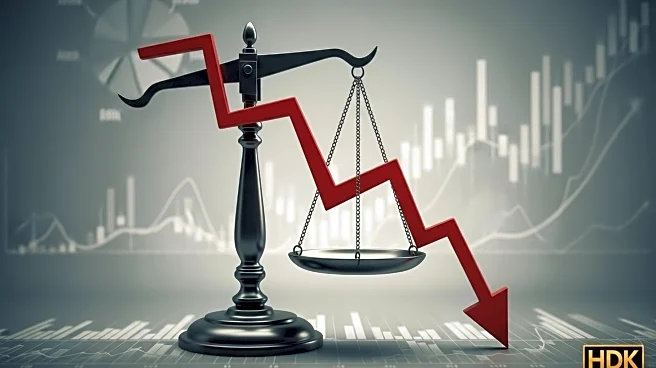What is the story about?
What's Happening?
Consumer sentiment in the United States has dropped to near-record lows, according to the University of Michigan's latest survey. The sentiment index fell to 55.1, marking the seventh-lowest reading since records began in 1952. This decline is attributed to fears of higher inflation, exacerbated by President Trump's recent announcement of new tariffs on trucks, furniture, and pharmaceuticals. Additionally, concerns over the labor market are contributing to the pessimism. Despite these challenges, Americans continue to spend, with personal consumption expenditures rising by 0.6% in August, as reported by the Commerce Department. Richmond Fed President Tom Barkin noted that unemployment remains low, nominal wages are increasing, and asset valuations are near all-time highs, which supports continued consumer spending.
Why It's Important?
The drop in consumer sentiment is significant as it reflects broader economic concerns, particularly regarding inflation and labor market stability. While sentiment has not been a reliable predictor of spending behavior since the pandemic, the labor market's condition remains crucial. Higher-income Americans continue to drive economic activity, while lower- and middle-income households face challenges due to the rising cost of living. This divergence in spending power is evident in sentiment surveys, highlighting economic inequality. The resilience of the stock market, buoyed by expectations of Federal Reserve rate cuts and strong company earnings, is providing some relief to higher-income households, maintaining their spending levels.
What's Next?
The Federal Reserve's recent decision to lower interest rates, coupled with low unemployment rates, suggests that consumer spending may remain stable in the near term. However, the slowing labor market and prolonged job searches for unemployed Americans could pose risks to economic conditions. The impact of President Trump's tariffs on consumer prices and sentiment will be closely monitored. Stakeholders, including policymakers and businesses, will need to address inflation concerns and labor market challenges to sustain economic growth.
Beyond the Headlines
The current economic situation underscores the importance of addressing income inequality and ensuring that economic policies do not disproportionately affect lower-income households. The divergence in consumer sentiment between income groups highlights the need for targeted measures to support those most affected by inflation and labor market shifts. Long-term strategies may involve enhancing job opportunities and stabilizing prices to foster a more equitable economic environment.














